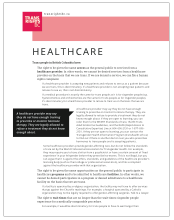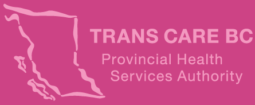Update: For information regarding the addition of Gender Identity and Expression to the 2016 BC Human Rights Code, and to the 2017 Canadian Human Rights Act, please visit the Explicit Protection page.

Trans people in British Columbia have:
- The right to be given the same access as the general public to services from a healthcare provider. In other words, we cannot be denied services from a healthcare provider on the basis that we are trans. If we are denied a service, we can file a human rights complaint.
- If a healthcare provider is accepting new patients, and refuses to see us as a patient because we are trans, this is discriminatory. If a healthcare provider is not accepting new patients and refuses to see us, this is not discriminatory.
- If a medical procedure is exactly the same for trans people as it is for cisgender people (e.g. hysterectomies and orchiectomies are the same for trans people as for cisgender people), it’s discriminatory for a healthcare provider to refuse to treat us on the basis that we are trans.
- A healthcare provider may say they do not have enough training to prescribe or monitor hormone therapy. They are legally allowed to refuse to provide a treatment they do not know enough about. If they are open to learning, you can refer them to the WPATH Standards of Care , the BC Trans Adult Endocrine Guidelines , and the RACE (Rapid Access to Consultative Expertise) Line. Local Calls: 604-696-2131 Toll Free: 1-877-696-2131. If they are not open to learning, you can contact Trans Care BC to find out if there is another doctor near you who prescribes hormones to trans people and is accepting patients.
- Some healthcare providers provide gender-affirming care, but do not follow the standards of care set by the World Professional Association for Transgender Health. For example, they may require you to have a letter from a psychiatrist or have a certain amount of ‘lived experience’ in your felt gender before they prescribe hormones. This is not illegal, but you can argue that it is against the ethics, standards, and guidelines of the healthcare provider’s licensing body (such as their college or professional association), and file a complaint against the healthcare provider with that organization.
- The right to be given the same opportunities as the general public to participate in healthcare programs and to be admitted to healthcare facilities. In other words, we cannot be denied participation in a program or denied admittance to a healthcare facility on the basis that we are trans.
- If a facility is operated by a religious organization, that facility may not have to offer services that go against the Church’s teachings. For example, a hospital operated by a Catholic organization may not be legally required to offer gender-affirming surgeries. Talk to a lawyer.
- The right to wait times that are no longer than the wait times cisgender people experience for a medically comparable procedure.
- For example, it would be discriminatory for trans people to have to wait longer than cisgender people for a hysterectomy or orchiectomy just because we are trans. (Note that in some cases trans people will wait longer than cisgender people for a medically justifiable reason. For example, a person with cancer can justifiably get a hysterectomy or orchiectomy faster than a trans person).
- Although the wait times for phalloplasty and vaginoplasty tend to be lengthy, it is very difficult to make a legal case that the wait times for these procedures are discriminatory. To make this case, we must be able to compare the wait times trans people face to the wait times cisgender people face for the same procedure. Since cisgender people do not tend to undergo procedures like vaginoplasty or phalloplasty, it is unlikely that these wait times would be seen by a court or tribunal as discriminatory. This does not mean we cannot lobby for improved wait times, it just means we will likely have more success with non-legal approaches.
- The same right to an abortion as cisgender women. At this time, there are no laws that prevent abortion in Canada.
- The right to access healthcare without being subject to discrimination, harassment, or violence.
- Discrimination against someone in the delivery of medical care means to deny them a service or facility which is available to other people because of a personal characteristic such as gender identity, religion, race, etc.
- In a medical setting, discrimination could include a refusal to acknowledge a person’s gender identity, chosen pronouns, or chosen name. In 2015, the Vancouver Police Department was required to pay $15,000 in damages to Angela Dawson, in part for repeatedly being referred to by her birth name against her wishes.
- Emergency medical situations can be complicated because it might be important for healthcare providers to know our genital status or what hormones we are taking. Nevertheless healthcare providers have a legal duty to respect our gender identity, and if they do not, they are discriminating against us. For example, it would be discriminatory for an ambulance paramedic to ask invasive questions about our gender status, unless the questions are related to the medical treatment we might need.
- Harassment usually means repeated and unwanted physical or verbal behaviour (for example, name calling) that is intended to offend or humiliate someone because of a personal characteristic, such as gender identity, religion, or race. In hospital, it could include being called names by other patients and having nothing done about it.
- In the context of medical care, any unwanted touching is an assault. That means that medical care providers have to get your consent before they give you a needle, examine you physically, or touch you in any other way.
- The right to have the same health plan coverage (through the Medical Services Plan or private health insurance) as cisgender people have for the same procedures.
- It is not considered legally discriminatory for the Government of British Columbia or a private health insurance company to fail to provide coverage for a treatment for trans people if a comparative treatment is not available to cisgender people (i.e. facial feminization surgery is not covered for cisgender people, so the lack of coverage for trans people would not likely be considered discriminatory). This does not mean we cannot lobby for coverage for these treatments. It just means we will likely have more success with non-legal approaches.
- If a procedure is covered for cisgender people and a comparable procedure is not covered for trans people, this may be discriminatory (i.e. if chest surgery was covered for men with gynecomastia – excess breast tissue in men – but not for trans men or non-binary people, this would be discriminatory).
How can you stand up for your rights?
Despite having rights, trans people often experience healthcare-related discrimination. Standing up for our rights can be difficult. However, it can make a big difference in our lives and the lives of other trans people.
If you feel your doctor is not providing quality care or following the best standards of practice, you can:
- Talk to the healthcare provider about the problem and how you would like to see it resolved. You may wish to bring a support person or have a friend or advocate speak on your behalf. Keep notes about the problem and how you tried to resolve it.
- If you cannot resolve the problem with the healthcare provider directly, check to see if they have a manager you can speak with. Explain the problem, what steps you took to resolve it, and what you feel would solve the problem. The manager may be able to help you find a solution.
- If this does not solve the problem, you can file a complaint with the healthcare provider’s professional body. See the tab below titled, ‘How do you complain about a healthcare provider to their licensing body?‘
- If the healthcare service was provided in a clinic operated by one of the provincial health authorities, you can file a complaint with a Patient Quality Care Office.
- If you are not satisfied with the Patient Quality Care Office’s response, you can request a review of the matter.
In any of these situations, you can try to find another healthcare provider willing to accept you as a patient. It can be difficult to find a healthcare provider who is trans-friendly and knowledgeable about trans health. Contact the Trans Care BC’s Care Coordination Team for the names of primary care providers near you that provide gender-affirming care.
If a healthcare provider refuses to accept you as a patient because you are trans, you can:
- Talk to a lawyer.
- File a human rights complaint against the healthcare provider and/or the organization they work for.
- File a complaint with the healthcare provider’s professional body.
- File a complaint with the Patient Quality Care Office of your health authority – but only if the clinic is operated by the health authority.
If a healthcare provider harasses you or is violent towards you because you are trans, see our Harassment and Violence section . You can:
- Get support from victims’ services (see the Resources section).
- Talk to a lawyer.
- File a human rights complaint against the healthcare provider and/or organization they work for.
- File a complaint with the healthcare provider’s professional body.
- File a complaint with the police against the healthcare provider.
- Sue the healthcare provider in civil court.
- File a complaint with the Patient Quality Care Office of your health authority – but only if they clinic is operated by a health authority.
- If you are not satisfied with the Patient Quality Care Office’s response, you can request a review of the matter.
If you experience harassment or violence in a healthcare setting because you are trans, see our Harassment and Violence section. You can:
- Get support from victims’ services.
- Talk to a lawyer.
- You may wish to advocate for the organization to make their facilities safer for trans people. You, a friend, or an advocate can talk to the manager of the facility to discuss steps they can take to prevent a similar situation from occurring again. If you are not satisfied with the outcome, you may choose to file a human rights complaint against the healthcare organization.
- File a complaint with the police against the attacker.
- Sue the attacker in civil court.
If a program or facility denies you treatment because you are trans, you can:
- File a human rights complaint against the organization providing service.
- File a complaint with the Patient Quality Care Office of your health authority – but only if the facility is operated by a health authority.
- If you are not satisfied with the Patient Quality Care Review Board’s response, you can request a review of the matter.
If you experience discrimination related to healthcare coverage under the Medical Services Plan or a private health insurance company, you can:
- Talk to a lawyer.
- File a human rights complaint against the BC Ministry of Health or the health insurance company respectively.
If you experience discrimination related to wait times, you can:
- Talk to a lawyer.
- File a human rights complaint against the BC Ministry of Health.
How do you complain about a healthcare provider to their licensing body?
-
Find out what licensing body the healthcare provider belongs to. Below are some common licensing bodies in healthcare.
| Doctors (including psychiatrists) and Surgeons | BC College of Physicians and Surgeons |
| Registered Nurses and Nurse Practitioners | College of Registered Nurses of British Columbia |
| Licensed Practical Nurses | College of Licensed Practical Nurses of British Columbia |
| Pharmacists | College of Pharmacists of British Columbia. |
| Registered Counsellors | There are a number of professional bodies that license counsellors, including BC Association of Clinical Counsellors |
| Paramedics | Emergency Medical Assistant Licensing Board |
- Write a letter to the complaint division of the person’s professional body. Include:
- The full name of the person you are complaining about.
- Where the problem happened.
- When it happened.
- What the person did. Be as specific as possible.
- Whether there were witnesses.
- Who you have spoken with so far to address your concerns (include their names and titles).
- How you would like to see the issue resolved.
- Your name and contact information.
- Know that the information you give may be shared with the person you complained against in order to get their response. The professional body will ask for their side of the story before making a decision about how to deal with the situation.
- Wait for a response from the professional body. The professional body may require the healthcare provider to change their practice or get further education. The healthcare provider may be reprimanded. In extreme cases, their license to practice may be taken away.
How do you complain about a healthcare provider to the Patient Quality Care Office?
- Find out which health authority the clinic belongs to. Then, find the contact information for that health authority’s Patient Quality Care Office
- Write a letter addressed to the Patient Quality Care Office. Include:
- The full name of the person you are complaining about.
- Where the problem happened.
- When it happened.
- What the person did. Be as specific as possible.
- Whether there were witnesses.
- Who you have spoken with in order to address your concerns (include their names and titles).
- How you would like to see the issue resolved.
- Your name and contact information.
- Know that the information you give may be shared with the person you complained against in order to get their response. The Patient Quality Care Office will ask for their side of the story before making a decision about how to deal with the situation.
- Wait for a response. The Patient Quality Care Office could recommend changes in policies, procedures, and practices.
- If you are not satisfied with the outcome, you can request a review by the Review Board.
- If this does not resolve the matter, you can complain to the Office of the Ombudsperson.
Who can you go to for help?
- For a free legal assessment of your situation, contact The Catherine White Holman Wellness Centre. Email lawyer@cwhwc.com to book an appointment. CWHWC has a legal clinic for trans and gender diverse people twice a month. There is a waitlist. Clinic lawyers are not able to represent you, but they can give you a list of lawyers who specialize in human rights complaints. If you cannot travel to the Catherine White Holman Wellness Centre, you may be able to set up an appointment by Skype. Another organization called Access Pro Bono has over 75 legal advice clinics throughout the province. Not all Access Pro Bono lawyers will be familiar with trans legal issues. For more information about Access Pro Bono and the programs it offers, or to find a legal advice clinic in your area, go to: accessprobono.ca or call: 1-877-762-6664.
- To find a lawyer, call the BC Branch of the Canadian Bar Association at 604-687-3221 or 1-800-663-1919 (Monday to Friday, 8:30am to 4:30pm). They can give you the name of a lawyer who does Human Rights Complaints and Charter cases, and who will have a consultation with you for up to 30 minutes for a fee of $25 plus tax.
- To find the contact information for a lawyer whose name you already know, you can use the Lawyer Lookup tool.
- For referral to victim support services, call VictimLink BC at 1-800-563-0808. The line is staffed by victim services workers who can refer you to the appropriate resources and let you know if there are any benefits available to you under the Crime Victim Assistance Program.
- For help filing a human rights complaint, contact the BC Human Rights Tribunal. The Tribunal also has an advocacy program. They may also be able to help you file a human rights complaint or represent you. However, there are rules about what cases the Coalition takes on. Contact the BC Human Rights Coalition at 604-775-2000 in the Lower Mainland or 1-888-440-8844 in the rest of BC.
Resources:
- Catherine White Holman Wellness Centre. A trans-run, volunteer-operated low-barrier centre providing health and wellness services to trans and gender diverse people.
- Trans Care BC. A BC-wide information hub providing access to information about gender-affirming care and supports.
- Trans PULSE Project: A community-based research project that looked into the impact of social exclusion and discrimination on the health of trans people in Ontario.
- The Human Rights Complaint Process for Transgender People in BC by barbara findlay, QC. To download it for free, click here.




